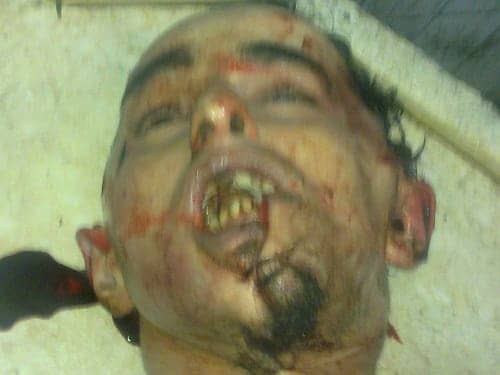“Broken Bones, Not Spirit” — Seeing “The Savior” in Fall of Egyptian Regime?
In the early days and fragile state of the post-Murabak revolution, here’s something we’ve really got to keep an eye on.
On Friday morning in the West, after Mubark stepped down and the worldwide excitement was fever-pitch over the victory of the Egyptian democracy protesters, this uncredited image — originally posted by Al Jazerra in this Egypt live blog — was re-posted and tweeted by several not-insignificant U.S. bloggers and media names. The motivation for plugging the photo, in the snippets that accompanied it, alluded to its iconic quality combined with the homage paid to the spirit of those Arab youth courageously seeking a new Egypt. In most instances where I saw it, the title of the link doubled as a caption: “Broken bones, not spirit.”
I’m not an art historian or a even a Middle East historian so I can’t speak to the classical quality and references of the image. (Maybe some of you can.) The way the lights in the buildings shine like stars in the sky, however, combined with the near-silhouette of the palm tree, the man spreading the blanket like a tent, and also the way the photo accentuates the robe-like folds in the person’s shirt far left, the image seems to evoke the desert and a biblical frame, and the wanderer/seeker as much or more than it says anything about modern, urban, downtown Cairo. Add to that the etherial light emanating from behind this man’s left shoulder, as well as the dramatic quality (is it day? is it night?) of the light on this chest and face, and the photo feels near mystical. Combine all these elements with the eyes cast skyward and the hand reaching up in an almost spiritual gesture and this young man is nearly deified. (If you’re thinking the image is too celestial or near-religious to be true, I was also thinking about some photoshopping going on here.)
Here’s what concerns me, however. If the image of Allah is never to be shown, the religious pull starts to feel decidedly Christian. Just close your eyes for a second, put long brown hair and a beard on this young man, and tell me you don’t see Jesus? Reinforcing that sense are other hand gestures, the man far left clasping his hands together before his face and especially the two fingers together on the main figure’s right hand strongly reminiscent of holy Christian gestures, including the sign of the cross or the judging Christ. Then, there is also a body of similar imagery of Jesus wandering in the desert.
Mostly though, I’m struck by the quick, strong and instinctive reaction to this laden photo at the very instant the Egyptian political clouds parted, the image speaking not just to an idealization of the events in Egypt, necessarily, but also as an inclination to recognize them through a more Christian lens.
—-
Note/Credit: As background on the picture itself, the photo — according to the Al Jazeera link – was sent in by a journalism student @ghazalairshad from Tahrir Square. As best I can tell, Ghazala did not post the photo directly anywhere but did retweet someone else who linked to the photo. I have written to Ghazala, a student at American University in Cairo, for more information on the photo.
Update:
Ghazala writes: “Shot by me during the evening prayer on February 5th in Tahrir Square.”/ “Believe me, if I had the time to Photoshop or Lightroom, I would have, but I just did a minor level adjustment in iPhoto & put it up on Facebook for the hundreds of worried friends & family back in the US to quiet them down for a bit.
__________________________
Ahdaf Soueif: Protesters reclaim the spirit of Egypt
 Hosni Mubarak's resignation came after 18 days of protests in central Cairo
Hosni Mubarak's resignation came after 18 days of protests in central Cairo
Egyptian novelist Ahdaf Soueif reflects on the determination of Egyptians, after the ousting of President Hosni Mubarak, to rebuild their country and reclaiming their national identity.
I have friends on anti-depressants who, over the last 20 days, forgot to take their pills and have now thrown them away. Such is the effect of the Egyptian Revolution.
On Friday night, Egypt partied. Chants and songs and drums and joy-cries rang out from Alexandria to Aswan. The defunct regime was only mentioned in reference to "we want our money back".
Otherwise, three chants were dominant - and very telling: One - "Lift your head up high, you're Egyptian" - was a response to how humiliated, how hopeless we'd been made to feel over the last four decades.
The second was: "We'll get married, We'll have kids," and reflected the hopes of the millions whose desperate need for jobs and homes had been driving them to risk their lives to illegally cross the sea to Europe or the desert to Libya.
The third chant was: "Everyone who loves Egypt, come and rebuild Egypt."
“Start Quo
We have a lot to learn very quickly. But we're working. And the people, everywhere, are with us”
And on Saturday, they were as good as their word: they came and cleaned up after their revolution.
Volunteers who arrived on Tahrir [Square] after mid-day found it spick and span, and started cleaning up other streets instead. I saw kids perched on the great lions of Qasr el-Nil Bridge buffing them up.
I feel - and every parent will know what I mean - I feel that I need to keep my concentration trained on this baby, this newborn revolution - I need to hold it safe in my mind and my heart every second - until it grows and steadies a bit. Eighty million of us feel this way right now.
Eighty million at least - because the support we've been getting from the world has been phenomenal. There's been something different, something very special, about the quality of the attention the Egyptian revolution has attracted: it's been - personal.
People everywhere have taken what's been happening here personally. And they've let us know. And those direct, positive and emotional messages we've been receiving have put the wind in our sails.
We have a lot to learn very quickly. But we're working. And the people, everywhere, are with us.
Tuesday 8 February

In the week before the protesters achieved their goal, Ahdaf Soueif reflected on some of the humorous and poignant moments in Cairo's Tahrir Square.
What is happening on the streets and squares of Egypt is extraordinary; it's nothing less than millions of people re-finding their voice - and using it.
They're using it to demand the removal of Hosni Mubarak and his regime - with everything that that regime entails: the corrupt cabinet, the fraudulent parliament, the mutilated constitution and the brutal emergency laws.
And this common, over-arching demand is being given increasingly creative and individual expression.
'Depart!'The atmosphere on Tahrir Square is like - well, imagine a fair, where the product under scrutiny is politics, economics, governance, history and the law.
 The demonstrators vowed to stay in Tahrir Square until Mr Mubarak stepped down
The demonstrators vowed to stay in Tahrir Square until Mr Mubarak stepped down
Circles of people sit on what's left of the grass to talk, friends stroll arm-in-arm discussing, marchers go by chanting and singing, bands play old protest favourites and new-minted anthems.
People carry home-made placards with their own messages.
The most common, of course is "Irhal!" ("Depart!"). But with the days passing, I've seen more impatient ones like "Irhal, my arm's hurting", "Irhal, I really need a shower", "Irhal, I can't find another joke", "Irhal means leave", and others.
One man has outlined a huge airliner on the ground with used paper cups and keeps everyone out of its outlines because the plane's ready to whisk Mubarak away.
“Start Quote
Ahdaf SoueifOne thing that Tahrir has already given us is a sense of who we are”
A huge sheet of plastic pockets has been hung up and the pockets are speedily filling with caricatures.
This revolution is so organic, so personal, so real, it has exploded reservoirs of creativity in everybody taking part.
Each person coming to the square brings something: medical supplies for the field clinics which are still treating the people damaged by Mr Mubarak's police and thug militias, blankets for the thousands spending the night, cartons of water, biscuits.
Teams of young volunteers collect litter. The resulting piles are labelled "National Democratic Party".
This is not to say that all is well with us.
The government has, for the moment, withdrawn its police and its thug militias and the army sits on the periphery of Tahrir Square - to protect us.
 Protesters slept on the tracks of the tanks to prevent the army from moving them
Protesters slept on the tracks of the tanks to prevent the army from moving them
But the army has now put up barbed wire to narrow the entrances and exits and they're trying to move their tanks further into the square.
When the young people lay down in front of the tanks Sunday night, they fired volleys of shots into the air and dragged away three young men and beat them. The situation was diffused when a well-liked public figure intervened.
This is what we older revolutionaries are doing - putting everything we have at the service of the brave young people who have cleared a space from which we can all join the effort to reclaim our state.
Tahrir has become our civic space where leftists and liberals and Muslim Brotherhood discuss and sing and eat together.
The other cities and towns of Egypt have sent popular delegations.
The consensus is that the consensus will come out of Tahrir.
And one thing that Tahrir has already given us is a sense of who we are.
'Revolution'People are actually articulating: "They said we were divided, extreme, ignorant, fanatic - well here we are: diverse, inclusive, hospitable, generous, sophisticated, creative and witty."
 Ahdaf Soueif addressed the crowd of demonstrators in Tahrir Square in early February
Ahdaf Soueif addressed the crowd of demonstrators in Tahrir Square in early February
In Philip Pullman's Northern Lights, the aim of the evil guys is to sever children from their spirits so releasing the energy needed by the government.
Well, that's a brilliant metaphor for what we feel has been happening to us in Egypt.
We were being deliberately severed from everything we hold dear, in the service of keeping the region subservient to American and Israeli interests.
And the only Egyptians to gain anything by this were the members and cronies of the regime who amassed spectacular wealth at the material, moral and emotional expense of their fellow-citizens.
On Sunday in Tahrir, Christian masses were celebrated and Muslim prayers were said.
We all prayed together for the young people killed by the regime since 25 January and before.
Later, there was a wedding, and later still magicians and acrobats and small camp fires.
This enormous revolution that is happening in our streets and our homes is the Egyptian people reclaiming their state, their heritage, their voice, their personality.
Be with us.
>via: http://www.bbc.co.uk/news/world-middle-east-12393795
>via: http://english.aljazeera.net/news/middleeast/2011/02/201121322143201645.html
Tahrir Square: The Many Little Revolutions

This afternoon I received this photo of Maggie, an Egyptian Christian friend who is a documentary filmmaker. When I asked her if I could post the photo on my blog, she sent me this email in return.Maggie wrote: The Arabic sign says “Ahmed (a Muslim name) and Mina (a Christian name) hand in hand.” The Arabic literally says “one hand.” The name of the young woman with whom I am standing is Nariman. Much to my shame, I had never talked to a woman with a niqab (total head cover) before. Although I have been going to Tahrir regularly, last Sunday was different. And even though Tahrir is where the Egyptian revolution is taking place, I am convinced that there are personal revolutions happening there daily. A man with a beard [signifying a Muslim] stood next to me and told me, "This is the first time I have heard Christians pray." He offered me dates and sang “Bless our country” with us. One of the Muslim Brotherhood members in Tahrir said, "I can honestly say that today is the first time that I've ever met a Christian brother. We hugged and kissed and I cried because I've never felt so close to another Egyptian who wants the same things that I do.” People may disagree on how representative these [relational transformations] are, but surely we agree on how wonderful and irreversible these personal revolutions are. My friend has spoken with one member of the Muslim Brotherhood in Tahrir and the man was so apologetic of what he has always called Westernized [Christian] girls in jeans. He said that they were the first to rush to his aid when he was injured and to provide him with first aid and water. He too has had a personal revolution and promised never to misjudge these young people again. It was truly heartwarming to hear. I am grateful for the many personal revolutions that we all experience there every day we go. In Arabic the word “Tahrir” means liberation, but it is a present continuous verb. Tahrir—liberation— is the work of every day and it may never be over. Sorry for the long email...but I just wanted to give context to the photo.
Much love, pray for Egypt.
Maggie
>via: http://lynnehybels.blogspot.com/2011/02/tahrir-square-many-little-revolutions...
__________________________
Egypt revolution youth form national coalition
 Translate
Translate
by Salma Shukrallah
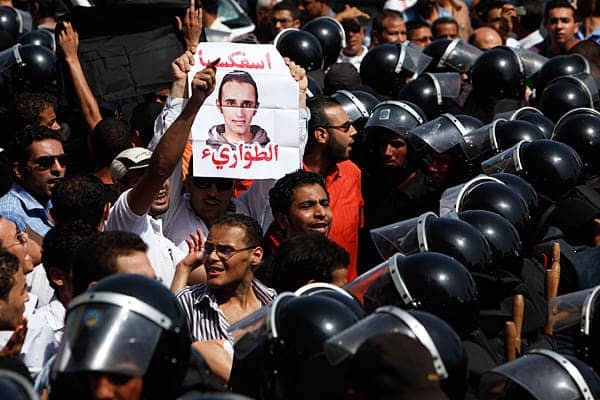
The Khaled Said Facebook group, which was formed to commemorate the 28-year-old who died at the hands of Egyptian police, had taken the initiative to declare Jan. 25 a day of Egyptian revolt to condemn police brutality. Following their steps, several bloggers, Facebook and Twitter users, as well as activist groups and associations, quickly adopted their call. Although few believed it could actually happen, the initiative snowballed to become Egypt’s largest uprising in its modern history.
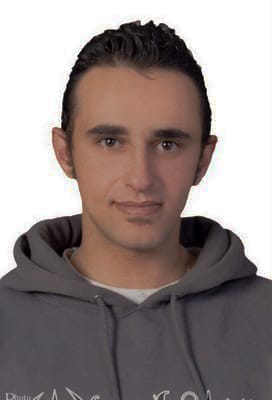
The group representatives include Ahmed Maher and Mahmoud Samy from the April 6 Youth movement, ElBaradei supporters Ziad Alimy and Abdel Rahman Samir, Islam Lotfy and Mohamed Abbas from the Muslim Brotherhood, Shady Ghazali Harb and Amr Salah from the Democratic Front Party and from the Youth for Justice and Freedom, Khaled Sayed and Mostafa Shaki.
Additionally, Wael Ghonim, one of the founders of the Facebook group “Kolona Khaled Said” (“We are all Khaled Said”), as well as independent activitsts Naser Abdel Hamid, Abdel Rahman Faris and Sally Moore, are also members.
According to Ahmed Ezzat, a HASHD and coalition member, the coalition is still expanding and intends to include other young and diverse political trends that have been part of Egypt’s political sphere over the past few past years.
“Although it started with only these groups, we hope it expands to include all the other young activists, including young members from the Karama party, Labor party, Kifaya and all others, including independent bloggers and Internet activists,” says Ezzat.
Not claiming that they are talking on the uprising’s behalf, the coalition was formed with an aim to provide representation for the young who have played a role in political life in Egypt and have contributed to the current revolt. However, the uprising has taken its own path, independent of these groups, and, according to many of their members, the coalition only aims to articulate its demands and keep them at the forefront of public consciousness as Egypt prepares for change.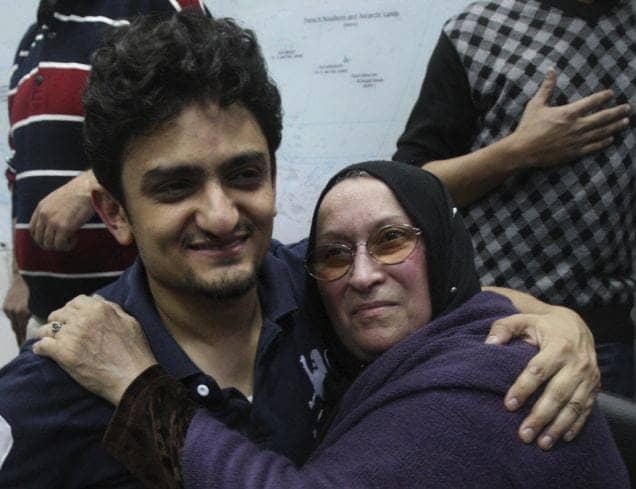
The coalition’s stand was not to engage in any negotiations until President Mubarak stepped down. While many coalitions claiming to represent the revolt involved themselves in such talks with government bodies, the coalition of the Revolution’s Youth insisted on its primary demand before any details are discussed.
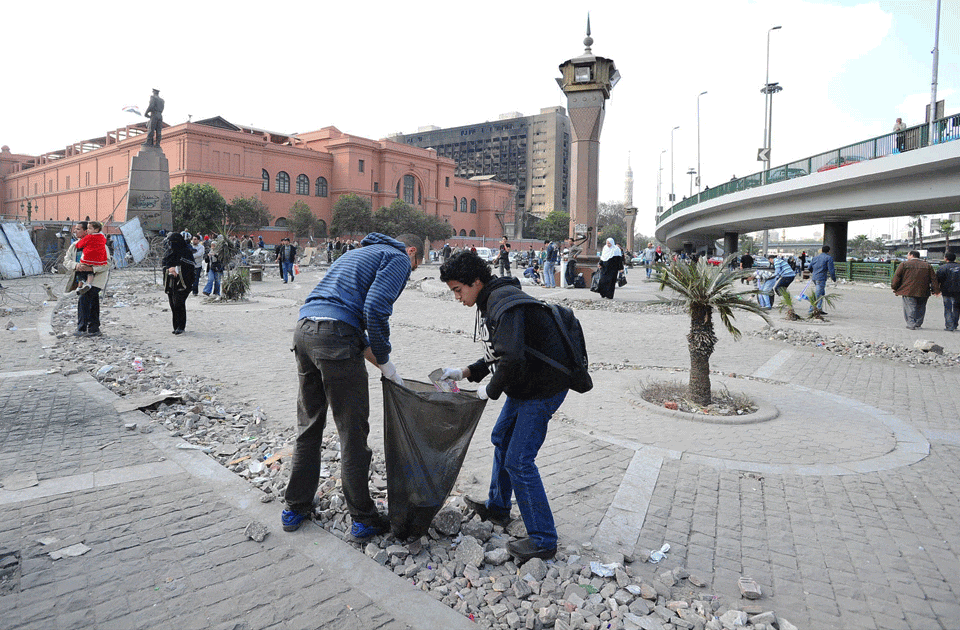
The coalition’s main challenge now is to sustain an organized body in which the thousands of young Egyptians who took to the streets can be represented.
Salma Shukrallah is a Cairo-based journalist forAhramOnline, where this story first appeared. Contact her on Facebook and Twitter.
Police brutality drug case sparked Egyptian revolution
“We are all Khaled Said” is a popular saying in Egypt among the country’s insurgents. Said waskilled on June 6 by Alexandria police who claimed he choked on a bag of marijuana. The grisly truth that he’d been beaten to death instead fueled the campaign to oust President Hosni Mubarak.
Shortly after Said had accidentally received a video of police stealing seized marijuana on his computer, he was accosted by authorities in an Internet cafe, where police repeatedly smashed his head on a marble table. Two officers charged with Said’s murder escaped from jail during the recent uprising and are currently at large.
“The youth now feel that through this revolution, they have avenged Khaled’s death,” says Ali Kassem, Said’s uncle. “Khaled’s soul gets more peace every day thanks to the effort and determination of the youth to bring down this corrupt government.”
People & Power reveals the story behind the unprecedented political protests in Egypt. Over the course of a remarkable fortnight, People&Power has been filming exclusively behind the scenes with a core group of young activists.
This story originally appeared on CelebStoner.com. It begs the question, what could the U.S. youth overthrow who say, “We are all Oscar Grant”?







